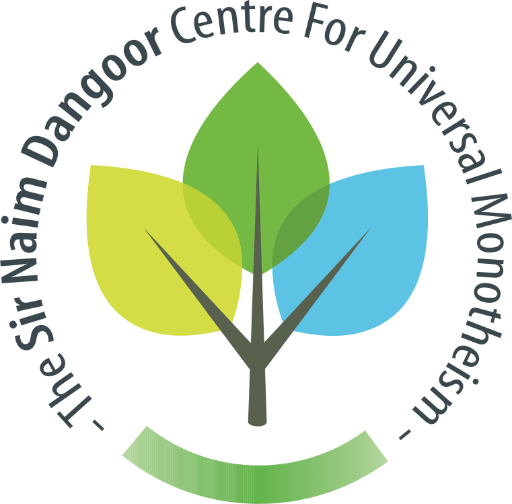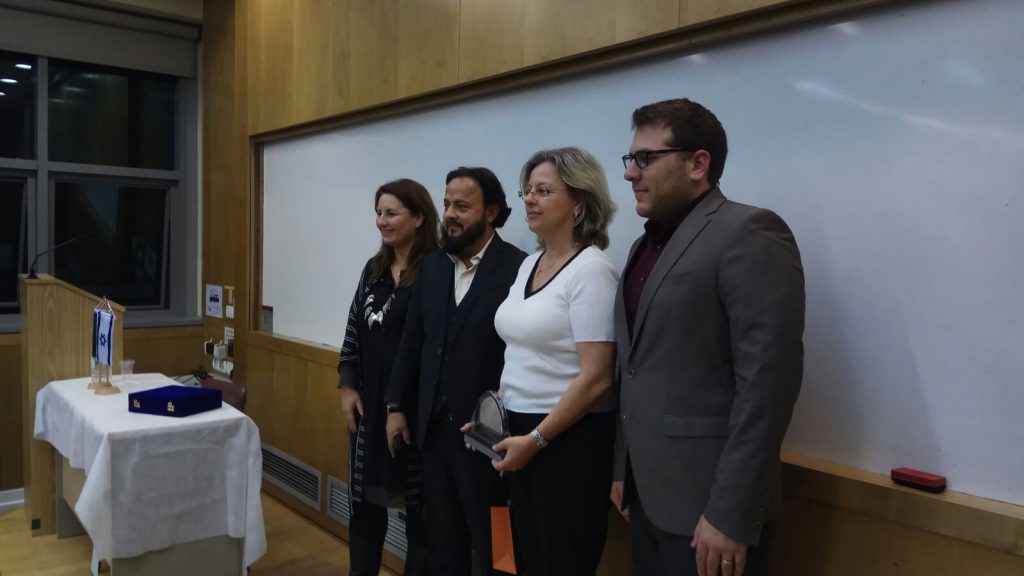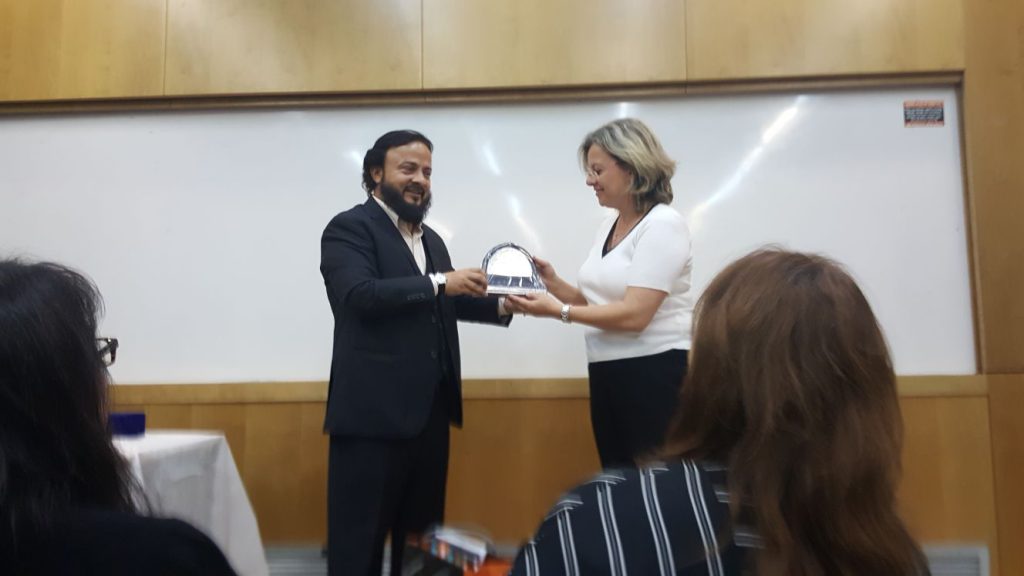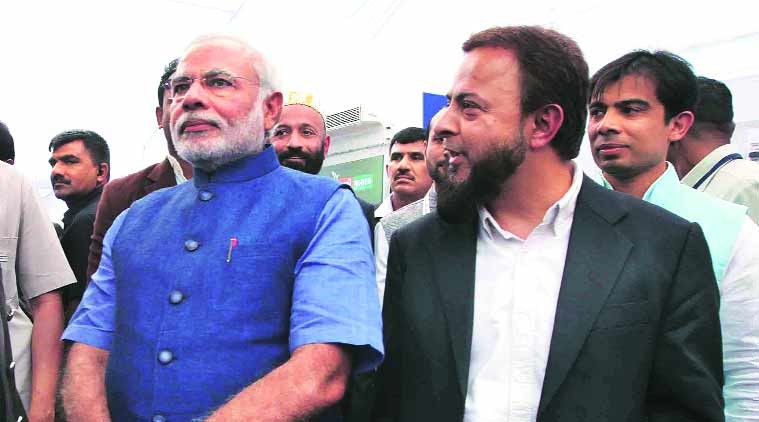Mr. Shri Zafar Sareshwala, Indian adviser on Muslim affairs to India’s prime minister ,Chancellor, Maulana Azad National Urdu University (MANUU), Hyderabad India
“When there is a successful project it doesn’t matter to anyone what the religion of the inventors is, but what contribution it makes to business and humanity”.
During his first visit to Israel, Muslim Indian industrialist Sri Zafar Sareshwala, honorary chancellor of Maulana Azad National Urdu University, (MANUU), Hyderabad India which promotes technology education among Muslims, lectured at Bar-Ilan University on November 2017. Event hosted jointly by Adv. Anat Bernstein Reich, Chairperson of Israel-Asia chamber of Commerce and the Dangoor Centre.
Sareshwala, a devout Muslim, leading Indian businessman and well-known philanthropist in his country. He is one of the founders of the Parsoli Groups and presently is the Director of Parsoli Motor Works Pvt. Ltd. He is considered an entrepreneur in Islamic Banking and Finance. He is now a close adviser on Muslim affairs to India’s prime minister and represents the right-wing party in the country’s Muslim communities
In his lecture, he told his fascinating personal story and then presented his moving vision to the audience.
Janab Zafar Sareshwala, who is a deeply religious by heart yet an extremely modern in his attitude and approach, is a man with a vision. He aims to equip Urdu knowing people with the best in higher education and ensure their mobility in the competitive market. He is determined efforts have borne fruit with growing awareness and acceptance of Islamic financial products and services in India. Janab Sareshwala has travelled widely. Recently he accompanied the Prime Minister on his trips to Japan, the United States and to the G-20 Summit held in Australia.
In 2002, Sareshwala said, riots took place in Gujarat, India’s westernmost state, that were directed against the Muslim community in which more than 3,000 people were killed, thousands injured and tens of thousands were damaged by looting, destruction of property and the burning of homes. The state of Gujarat was then led by India’s current Prime Minister, Narendra Modi. After Sareshwala’s family and business were critically damaged in the riots, he and his family immigrated to London. From there, he led a lawsuit in the United Nations against Modi, who he saw as the main culprit in the events. As a result of the lawsuit Modi was denied entrance to Britain and the United States until he was elected prime minister of India in 2014.
Three years later, in 2005, after a personal meeting with Narendra Modi, Sareshwala decided to return to India and publicly declare that he understood the only way to improve the status of Muslims in India was through cooperation with the regime. He became Modi’s right-hand man and encouraged the Muslim minority (about 200 million people) to join the right-wing BJP party and other right-wing groups, such as the RSS Movement, and to compete for key public roles by acquiring an education. In addition, he worked to strengthen diplomatic relations between the Gulf States and India, and to this day serves as Honorary Consul of India in these countries.
Janab Zafar Yunus Sareshwala, the Honorable Chancellor of Maulana Azad National Urdu University is a technologist, businessman and a renowned philanthropist. He has a Diploma in Mechanical Engineering and Post Graduate Diploma in Marketing Management. He is one of the founders of the Parsoli Groups and presently is the Director of Parsoli Motor Works Pvt. Ltd. He is considered an entrepreneur in Islamic Banking and Finance. Janab Zafar Sareshwala is a man with a vision. He aims to equip Urdu knowing people with the best in higher education and ensure their mobility in the competitive market.
Janab Sareshwala is deeply religious by heart but extremely modern in his attitude and approach.
Janab Zafar Sareshwala possesses more than 25 years of experience in marketing financial products and services across the globe. He joined the stock markets in the late 1980s.
His determined efforts have borne fruit with growing awareness and acceptance of Islamic financial products and services in India.
His vision and guidance had been the driving force behind the growth and success story of Parsoli Corporation Ltd. which had been awarded as the ‘Best Islamic Broking’ firm for the year 2007 and had been nominated in the category of ‘Best Index Provider’ for the year 2009 by the Islamic Finance News, one of the leading global Islamic news provider. Parsoli also branched out to become the principal dealer for BMW-India for the state of Gujarat in 2007-08 through Parsoli Motors Ltd. and they have their presence in Ahmedabad, Surat and Rajkot.
Janab Sareshwala has travelled widely. Recently he accompanied the Prime Minister on his trips to Japan, the United States and to the G-20 Summit held in Australia.
Sareshwala spoke at length about his worldview on the Israeli-Palestinian conflict. He said that the opposition in India was vehemently opposed to Indian Prime Minister Modi’s visit to Israel, the first such visit by an Indian Prime Minister. Their claim was that such a state visit was an insult to the entire Arab world, as well as ignoring the plight of the Palestinian people suffering under the Zionist occupation. Sareshwala rose against them and told them that India should not rely on empty slogans, clichés and values that might have been relevant yesterday, but have become obsolete. He told them that they must move forward and find a way to integrate into the discourse of the New World. “The modern world,” he explained, “is ever-changing. If in the past we were excited by a breakthrough once in a century, then by one every fifty years, today there is a technological breakthrough at any given moment. The leaders of India must think about what they have to offer the world and what they can learn in order to move forward. Israel, in this respect, is a technological superpower and it would be foolish to ignore its achievements.
We are business people. When there is a successful project it doesn’t matter to anyone what the religion of the inventors is, but what contribution it makes to business and humanity. Does the fact that Mark Zuckerberg is Jewish change the way you use Facebook? Moreover, did Israel’s Jewishness prevent the Indian government from acquiring billions of dollars of advanced military technology from her? Why does the symbolic act of a formal visit to Israel cause so much resistance?” In his address to Parliament, Sareshwala said he attacked the opponents of the visit by saying, ‘Do not use our [the Muslims] shoulder to fire your hypocrisy weapon. This symbolism is irrelevant. We don’t need the unnecessary symbolism of the Iftar hat”. He explained that during the Muslim holiday of Iftar, government ministers of all faiths wear the ‘Iftar hat’ on their heads. It is an unnecessary and hypocritical symbol that is no longer necessary, devoid of meaning, he said.
Sareshwala said that he reminded opposition members that the Indian Congress voted for the establishment of diplomatic relations with Israel in the late 1980s, and in 1991 a large government delegation arrived in Israel and signed huge trade agreements with Israel, especially in sensitive areas related to the military and security. “If this is the case,” he told them,” the agreement was perceived as legitimate, but not the visit? When the agreement was signed, there was no question as to whether the purchase fees that Israel receives from us goes to the settlements? Move forward, and leave those clichés behind.”
In his talk, Sareshwala also referred to the Palestinian struggle and said that in 2010 Mahmoud Abbas visited India, and at a joint press conference with the prime minister, Modi announced that India would provide $140 million in Palestinian aid. Sareshwala was not comfortable with the gesture and asked the Indian government tough questions: “Where does the money go?” he asked. “What do the Palestinians really want? Why don’t they use the money to ensure the wellbeing and education of the younger generation? Why don’t the leaders stand up for their right to move forward rather than be victims,” he added. “The world has changed. Look at us, as Muslims in our country we suffered from riots, looting, murder and humiliation, but at no point did we feel victimized. Through a deep and thorough process we realized that the way to change the way Indians see us is through schooling and higher education. Only in this way can we prevent the next massacre. We had two options — either to be dependent on the mercy of the government that tortured us or to solve our problems internally with our own strengths, in order to integrate later into big politics. Look at the difference between us and Israeli Arabs. The percentage of the population is similar, but in India only 4% are represented in the government as opposed to Israel, where 15% of Israeli Arabs are represented in parliament. Do you want to promote your agenda? Improve the standard of living of your community? Choose the right leaders who will aspire to this, but first- be a scholar.”
“That’s how I realized that the percentage of Muslims tested in entrance exams for institutions of higher education is particularly low. No one is preventing them from being tested, so it’s not a question of discrimination, but a lack of motivation. For that reason, I initiated and led the” Power of Tali” campaign and invested huge sums to encourage the Muslim population to take the test. This year we saw the difference with a significant increase in the number of those who registered for the exams, and the number of those accepted almost doubled. In addition, we provided holistic education training in economic education, including education toward financial values, budget management, capital market experts and the accompaniment of a regulator who explained market forces. Imams in mosques promote the change we propose in their sermons. Some of the mosques have opened schools, training centers for men and women to teach them how to pass the terrifying UPSC acceptance tests. “You must understand,” concluded Sareshwala, “a real revolution is not dependent on money or wars over real estate and land, but consists of three basic values: education, banking and business, which must be based on two essential elements of success: Honesty and integrity.”



